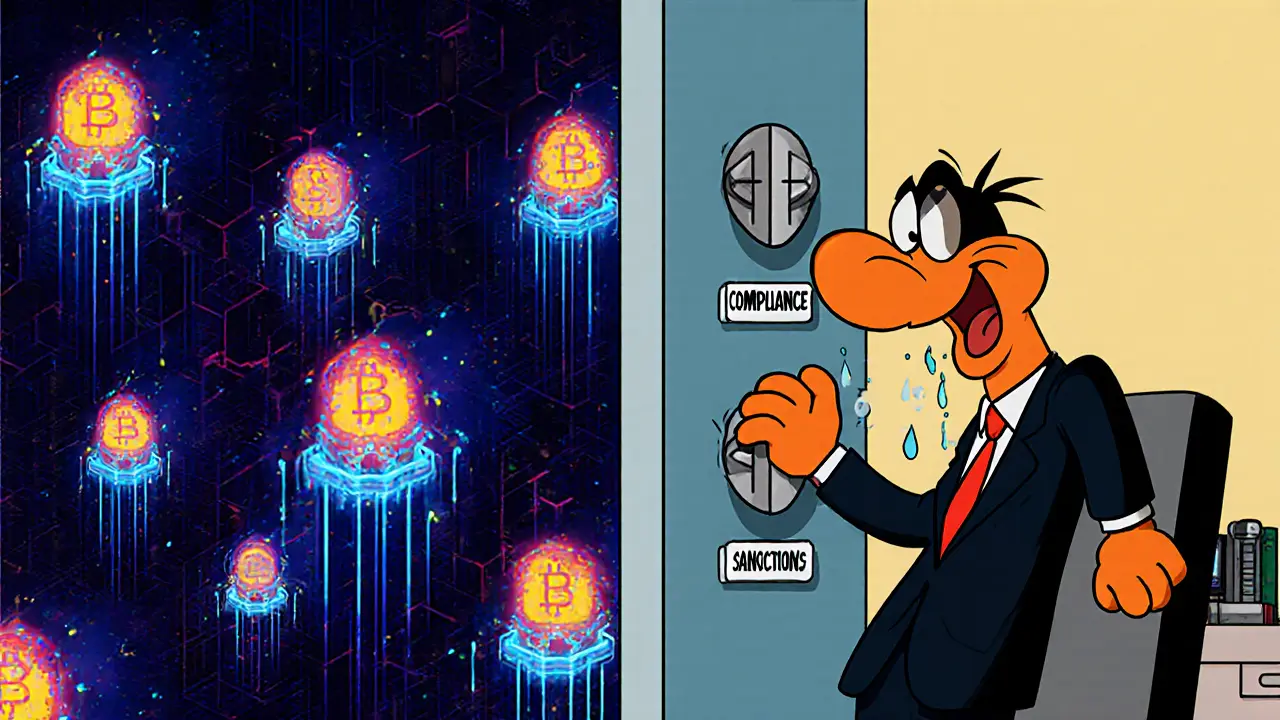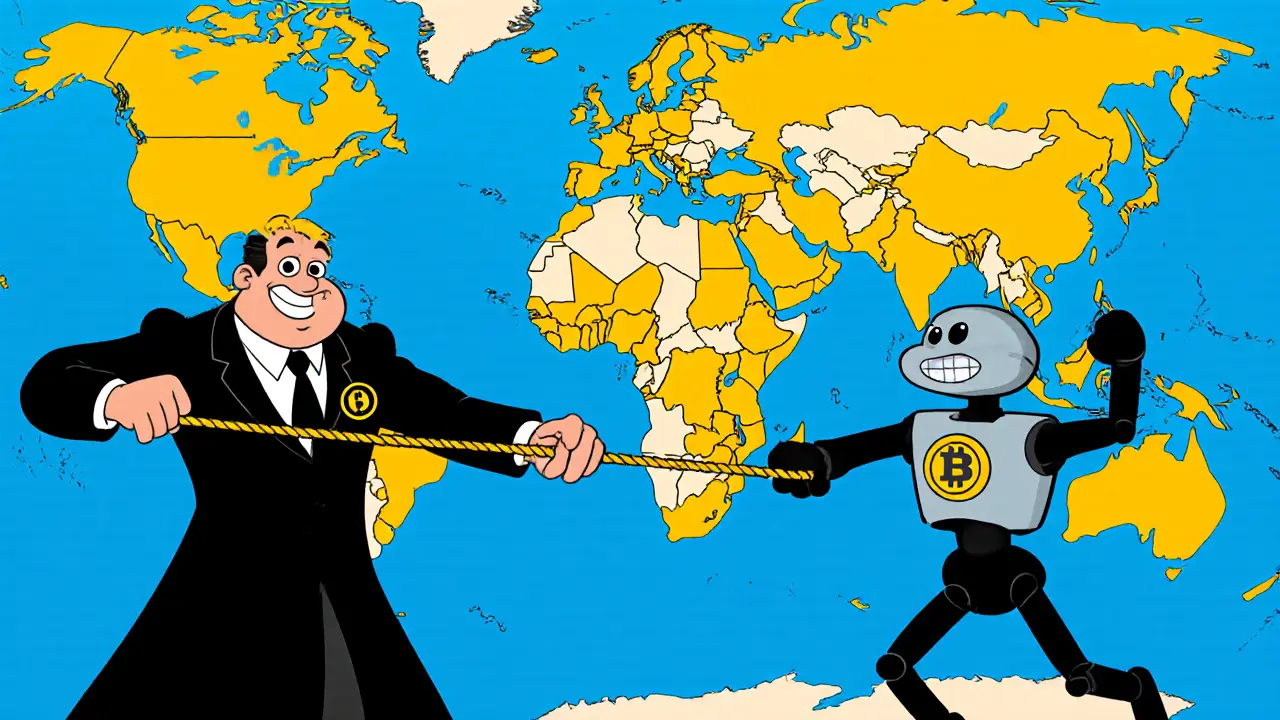
If you've ever tried to trade on dYdX from the United States, you know it's impossible. But here's the puzzle: dYdX markets itself as a decentralized exchange. So why can't you use it in your country? This isn't a glitch-it's a deliberate choice rooted in regulatory pressures that even the most 'decentralized' platforms can't escape. The reality is that dYdX restrictions exist because the platform's centralized compliance layers must adhere to global financial regulations, even as it claims decentralization.
The dYdX Paradox: Decentralized in Name, Centralized in Practice
dYdX is a cryptocurrency derivatives exchange that challenges the idea of true decentralization. Founded in 2017 by Antonio Juliano, a former Coinbase engineer and Princeton University computer science graduate, dYdX claims to operate across 160+ crypto perpetual markets in 180+ countries. Yet users in the U.S., U.K., Canada, Iran, Cuba, North Korea, Syria, Myanmar, Crimea, and other sanctioned regions face outright bans. How can a platform marketed as decentralized enforce geographic restrictions? The answer lies in its hybrid architecture: while trading happens on-chain, front-end operations and compliance are managed by centralized entities like dYdX Trading Inc. (New York) and the dYdX Foundation (Zug, Switzerland). These corporate structures exist to satisfy regulators, but they also mean dYdX isn't truly decentralized.
How dYdX Enforces Geographic Restrictions
When you try to access dYdX from a restricted country, the platform doesn't just block you-it locks your account in stages. First, you see red warning banners and can only cancel existing orders or close positions ("close-only mode"). Deposits, transfers, and new trades become impossible. If you stay in this mode for seven days straight, your account gets "Blocked." At this stage, you can't view trading history, access subaccounts, or withdraw funds through the frontend. The only option left is exporting your Secret Recovery Phrase to move assets elsewhere. This system isn't automated; it's enforced by dYdX Operations Services Ltd. (DOS), which monitors wallet addresses and IP locations. It's a clear signal that dYdX's "decentralized" label is more marketing than reality.

Why Governments Demand These Restrictions
These rules exist because of U.S. sanctions programs enforced by the Office of Foreign Asset Control (OFAC). dYdX must comply with the Bank Secrecy Act and anti-money laundering (AML) laws, which require blocking users from sanctioned countries. The platform's terms state that users must not be residents, citizens, or agents of restricted territories, and they can't transact with "Restricted Persons" listed by OFAC. This isn't unique to dYdX-most crypto exchanges face similar pressures. But here's the twist: while centralized exchanges like Coinbase or Binance also block users, dYdX's claim to decentralization makes the contradiction sharper. True decentralized protocols (like Uniswap) don't have central servers to block access, but dYdX's reliance on corporate entities forces it to follow traditional financial rules.
The Hidden Centralized Layers Behind the Scenes
Underneath dYdX's blockchain-based trading engine, there's a web of centralized control. dYdX Trading Inc. handles front-end services, user accounts, and compliance checks. The dYdX Foundation manages the DYDX token and governance, but it's registered in Switzerland, a jurisdiction with strict financial oversight. These entities enable dYdX to operate legally in many countries, but they also create single points of failure. For example, if OFAC adds a new country to its sanctions list, dYdX can instantly block all users there. A fully decentralized protocol couldn't do this-it would need community consensus to change rules, which takes time and isn't guaranteed. This hybrid model lets dYdX offer advanced derivatives trading (like leveraged ETH or BTC positions) while staying compliant, but it sacrifices the core promise of decentralization.

Who's Blocked? A Real-World Look at Restricted Countries
| Restricted Countries | Allowed Countries (Examples) |
|---|---|
| United States, United Kingdom, Canada, Iran, Cuba, North Korea, Syria, Myanmar, Crimea, Donetsk, Luhansk, Iraq, Libya, Mali, Democratic Republic of Congo, Côte d'Ivoire, Nicaragua, Somalia, Sudan, Yemen, Zimbabwe | China, Russia, South Korea, Japan, Vietnam |
This list isn't static. dYdX updates restrictions based on changing regulations-like when the U.S. added new sanctions against Russian entities in 2024. Interestingly, some countries typically banned by other exchanges (like China and Russia) remain accessible on dYdX, showing selective compliance rather than blanket restrictions. But this inconsistency creates confusion: why is Russia allowed while the U.K. isn't? The answer lies in specific regulatory nuances. For example, Russia's crypto regulations are still evolving, while the U.K. has strict AML rules that dYdX must follow to operate there. This patchwork approach highlights how decentralized finance (DeFi) platforms navigate a complex global regulatory maze.
What This Means for the Future of Decentralized Finance
dYdX's situation isn't an exception-it's a sign of broader challenges in DeFi. Most "decentralized" platforms have hidden centralized components (like governance tokens, development teams, or compliance departments) that make them vulnerable to government pressure. Projects like Aave or Compound face similar issues: they claim decentralization but rely on centralized entities for legal operations. This tension will only grow as regulators worldwide crack down on crypto. For users, it means "decentralized" often means "regulated with a blockchain veneer." True decentralization would require protocols that can't be shut down by any single authority, but that's still theoretical. Until then, dYdX's restrictions remind us that blockchain technology alone can't escape traditional financial systems-it must work within them.
Why does dYdX block users in some countries if it's decentralized?
dYdX isn't fully decentralized. While its trading engine runs on blockchain, front-end services and compliance are handled by centralized entities like dYdX Trading Inc. and the dYdX Foundation. These corporate bodies must follow laws like OFAC sanctions, which require blocking users from certain countries. True decentralized protocols (like Uniswap) don't have this issue because they lack central points of control-but dYdX's hybrid model means it's subject to traditional regulations.
Can I use a VPN to bypass dYdX restrictions?
Using a VPN to access dYdX from a restricted country violates their terms. The platform detects VPN usage and may flag your account for compliance review. If caught, you could lose access to funds or face legal consequences. dYdX's compliance team actively monitors IP addresses and wallet activity to enforce geographic restrictions, so bypassing them isn't a safe or legal option.
What happens if I accidentally trade from a restricted location?
If dYdX detects your location violates their terms, your account enters "close-only mode." You can only cancel orders or close existing positions-you can't deposit, withdraw, or open new trades. After seven days in this mode, your account gets "Blocked," freezing all activity except exporting your Secret Recovery Phrase. There's no appeal process, so it's critical to confirm your location is allowed before using the platform.
Are there truly decentralized exchanges without country restrictions?
Yes, but they're rare. Fully decentralized protocols like Uniswap or SushiSwap operate without central servers or compliance teams, so they can't block users by location. However, these platforms typically offer basic spot trading, not derivatives like dYdX. They also face regulatory risks: if governments target them, they could lose access to centralized infrastructure like payment processors or exchanges. True decentralization means no single entity controls the platform, but it also means no one can guarantee regulatory compliance.
How do dYdX restrictions affect DeFi's growth?
dYdX's restrictions highlight a core conflict: DeFi promises financial freedom, but regulators demand control. This tension slows adoption in strict jurisdictions and pushes users toward unregulated (and risky) alternatives. For DeFi to scale globally, protocols need better ways to balance compliance and decentralization-like self-regulating on-chain systems or legal frameworks that recognize decentralized governance. Until then, platforms like dYdX will remain caught between ideals and reality, limiting their reach and credibility.

Jenna Em
October 22, 2025 AT 01:53We chase freedom on the blockchain, yet the shadows of nation‑states whisper in our ears.
Every time dYdX says it is decentralized, a hidden hand pulls the strings.
The compliance team is the invisible gatekeeper, deciding who may trade.
If you live in a sanctioned land, the system silently shifts you into a cage.
Thus the promise of a borderless market becomes an illusion.
Stephen Rees
October 30, 2025 AT 22:49There seems to be a paradox in the way dYdX presents itself.
On the surface it claims decentralization, but beneath lies a network of corporate safeguards.
These safeguards quietly enforce the rules set by governments.
Users in restricted regions find themselves unable to move beyond a “close‑only” mode.
It feels as though the freedom promised is merely a marketing veil.
Katheline Coleman
November 8, 2025 AT 20:46Thank you for highlighting the tension between the platform's marketing narrative and its operational realities.
Indeed, the hybrid architecture-on‑chain trading coupled with off‑chain compliance-creates a gray area for users.
From a regulatory standpoint, the presence of a corporate entity in the United States necessitates adherence to OFAC sanctions.
Consequently, the platform must enforce geographic restrictions to avoid legal repercussions.
I appreciate the nuanced discussion and hope this clarification assists other readers.
Amy Kember
November 17, 2025 AT 18:42dYdX markets freedom but locks doors for half the world
the compliance team decides who can trade and who cannot
no hidden agenda just legal necessity
users should read the terms before getting excited
Evan Holmes
November 26, 2025 AT 16:38Another day, another excuse for a “decentralized” exchange to act like a bank.
Isabelle Filion
December 5, 2025 AT 14:35Ah, the ever‑so‑insightful observation that dYdX, a beacon of innovation, merely replicates traditional financial gatekeeping.
One might even jest that the platform’s “decentralization” is as authentic as a plastic plant.
PRIYA KUMARI
December 14, 2025 AT 12:31The reality is stark: dYdX is a façade designed to lure sophisticated traders into a veneer of autonomy while preserving a corporate stranglehold.
Its compliance apparatus is not a peripheral feature; it is the core engine that decides market access.
Government pressure is not a distant threat but a daily operational parameter that shapes every transaction.
Any claim of true decentralization is a deliberate misdirection meant to attract capital.
Jessica Pence
December 23, 2025 AT 10:28i think it might help to note that you can still move your assets out by exporting your seed phrase.
just make sure you store it safely and double‑check the address before sending.
also, using a reputable wallet can avoid some of the compliance headaches.
sorry for any typos, hope this helps!
johnny garcia
January 1, 2026 AT 08:24In the grand tapestry of decentralized finance, dYdX occupies a paradoxical node where liberty and jurisdiction intersect.
One could argue that true sovereignty on the blockchain is an ideal, not a present reality 🍃.
Thus the platform's hybrid model reflects the transitional state of our digital economies.
It is both a symptom and a catalyst of the evolving dialogue between innovators and regulators 📜.
Andrew Smith
January 10, 2026 AT 06:21Well said! It's encouraging to see such thoughtful analysis.
Even with these constraints, the community continues to build and innovate.
I'm confident that future solutions will bridge the gap between freedom and compliance.
Let's keep supporting each other.
Ryan Comers
January 19, 2026 AT 04:17So the so‑called “decentralized” exchange bows to the very powers it claims to defy!
It’s a classic example of the elite’s double standards, pretending to champion freedom while kowtowing to Washington’s whims.
Patriots should expose this hypocrisy and demand truly borderless platforms.
Enough with the corporate puppetry!
Prerna Sahrawat
January 28, 2026 AT 02:13The narrative you present, while theatrical, obscures the intricate economic and legal underpinnings that govern contemporary financial infrastructures.
dYdX, as a hybrid entity, operates at the intersection of permissionless blockchain technology and the pragmatic necessities imposed by sovereign legal frameworks.
To claim that it should be wholly exempt from jurisdictional oversight disregards the very reality that on‑chain derivatives impact real‑world assets and thus attract regulatory scrutiny.
Furthermore, the notion that a platform can exist in a vacuum, untouched by the gravitas of nation‑state policy, is a romantic illusion that has been debunked repeatedly in scholarly discourse.
The compliance apparatus embedded within dYdX serves not merely as a gatekeeper but as a calibrated mechanism ensuring that the platform does not become a conduit for illicit activity.
When users from sanctioned territories attempt to engage, the system's protocol, augmented by the Operations Services Ltd., enforces a 'close‑only' mode, thereby preserving the integrity of the market.
This procedural response, while lamentable to some, is in fact a testament to the platform's commitment to abiding by the Bank Secrecy Act and OFAC directives.
It is also a reflection of the broader tension within the crypto ecosystem, where innovators must navigate a labyrinth of legal obligations without sacrificing the core tenets of decentralization.
One might argue that such compliance is anathema to the ethos of freedom, yet it is precisely this balance that determines the sustainability of any financial instrument in the modern era.
In addition, the selective permissibility – allowing entities like Russia while restricting the United Kingdom – underscores the nuanced approach taken by dYdX in response to divergent regulatory regimes.
These decisions are not whimsical; they are rooted in rigorous legal analysis, risk assessment, and the strategic desire to maintain operational viability across multiple jurisdictions.
Consequently, castigating dYdX for adhering to these constraints reveals a superficial understanding of the complexities involved.
A more constructive critique would examine how the platform might further decentralize its governance layers, perhaps by empowering token holders to vote on compliance thresholds.
Such a paradigm shift could mitigate the bluntness of top‑down restrictions while preserving the necessary safeguards against regulatory breaches.
In summation, the paradox you highlight is less a flaw in the platform's design and more an emblem of the transitional phase in which decentralized finance currently resides.
Until a global consensus emerges that reconciles blockchain autonomy with statutory compliance, platforms like dYdX will remain emblematic of both innovation and concession.
Joy Garcia
February 6, 2026 AT 00:10Only by exposing the puppet strings can we truly claim freedom.